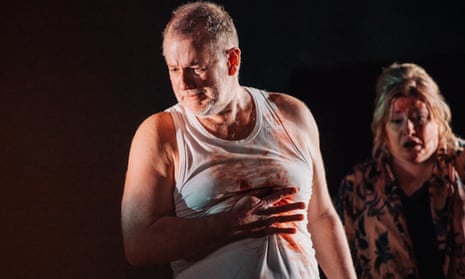What to do with Bluebeard’s Castle? Bartók’s single-act opera is so devastatingly complete, so ravaging in musical and emotional impact, that it needs nothing more or less than what unfolds within its own beautiful, horrifying arch. But opera companies like a double-bill. There are prosaic reasons, such as bar takings at the interval, and sometimes there are legitimate artistic reasons – respite or ballast or perspective.
What Scottish Opera has gone for in this co-production with the theatre company Vanishing Point is a new music-theatre-ish piece called The 8th Door – a kind of abstract prequel to Bluebeard, or possibly a sequel that comes first. I’m not sure what the reason for it is. Matthew Lenton, who directs both works, calls it a mirror: its characters aren’t quite Judith and Bluebeard, but they have the same yellow roses, the same wine glasses, the same inability to communicate. In a nod to Bartók’s librettist Béla Balázs, the piece uses Edwin Morgan translations of Hungarian poems, and the way the text blurs and circles is probably the best thing about the piece.

Live cameras project the faces of two actors (Robert Jack and the magnetically expressive Gresa Pallaska) on to a giant screen; it’s a neat trick but the novelty wanes. The music is by Scottish Opera’s young composer-in-residence Lliam Paterson, who does admirably enough given the daunting brief of partnering Bartók. He places six amplified singers in the pit and uses them for urgent threnodies and heavy breathing, and he gets a range of lush and spangling sounds from the orchestra. But to what end? The piece is atmospheric, reasonably diverting, unusually conceptual for Scottish Opera, but ultimately it feels aimless and trite and a missed opportunity.
Lenton suggests The 8th Door brings us closer to the world of Bluebeard’s Castle. Bartók and Balázs had their own device: a fairytale prologue that is transfixing when spoken in the original archaic singsong Hungarian. “Where is the stage, ladies and gentlemen?” asks the speaker. “Inside or out?” Lenton goes further with the breaking down of the fourth wall by getting Robert Jack to speak the prologue in English, but his delivery is too gallus for this dark drama. Possibly it’s meant to seem ordinary, to emphasise the resurgence of old stories in everyday life, because when the curtain rises we see an innocuous modern apartment. The horrors that await Judith infiltrate this unsuspecting living space; the first door opens via a laptop screen – is Bluebeard an online fetishist?

We get no answers as to why he does the grim things he does or why she is so intent on pursuing the truth. What is blatant is the beauty of the singing. Karen Cargill makes her debut as Judith and her vocal colours are ravishing – dark, velvety, harsh, coaxing, a whole breathtaking panoply. Her response to the opening of Door Five is crushingly vulnerable; her rapture at the lake of tears is sublime. Robert Hayward’s Bluebeard is diffident and regretful then charged with desire; it’s a subtle and compellingly inconclusive performance. Sian Edwards conducts with finesse.

Comments (…)
Sign in or create your Guardian account to join the discussion